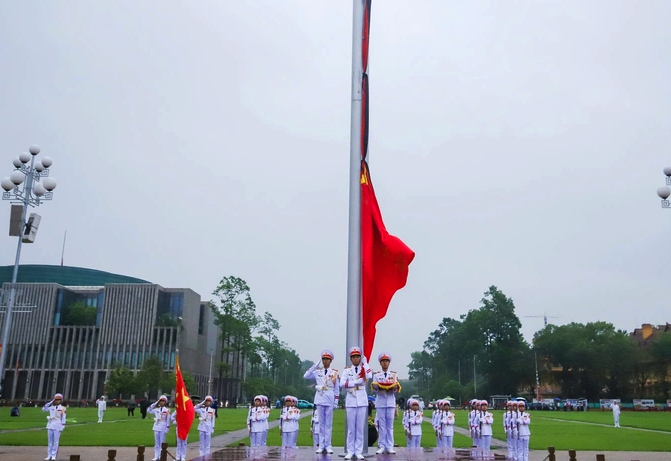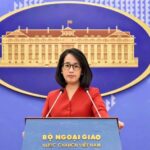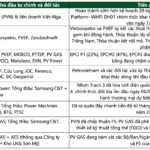The Ministry of Culture, Sports, and Tourism is drafting a decree to amend and supplement several articles of Decree 105/2012 on the organization of funerals for officials, public employees, and civil servants.

Image of flags at half-mast in Ba Dinh Square, Hanoi during a state funeral. Photo by Nguyen Huong
|
The draft decree proposes to supplement certain contents, including the decision-making authority of the Politburo regarding “the organization of state funerals for senior officials with significant contributions and great merits to the revolutionary cause of the Party, State, and people, and who possess high prestige both domestically and internationally.”
The Ministry of Culture, Sports, and Tourism proposes to supplement Clause 3, Article 5 on the organization of high-level funerals for deceased officials managed by the Politburo and the Secretariat, who are relieved of their duties, retired early, or retired in accordance with regulations due to violations or shortcomings.
Specifically, Clause 3 stipulates: “In the event that the deceased held one of the positions specified in Clause 1 of this Article (Article 5) and was relieved of their duties, retired early, or retired in accordance with regulations due to violations or shortcomings, the funeral shall be organized in the form of a high-level funeral.”
According to Article 5 of the current Decree 105, officials holding or having held one of the following positions: General Secretary, President, Prime Minister, or Chairman of the National Assembly, upon their demise, shall be accorded a State Funeral.
The organization of a state funeral for senior officials with significant contributions and great merits to the revolutionary cause of the Party, State, and people, and who possess high prestige both domestically and internationally, shall be decided by the Politburo.
Officials holding or having held one of the following positions: Member of the Politburo or Secretariat; Vice President; Deputy Prime Minister; Vice Chairman of the National Assembly; Chairman of the Central Committee of the Vietnam Fatherland Front; Chief Justice of the Supreme People’s Court; Prosecutor General of the Supreme People’s Procuracy; General of the Armed Forces; or Senior Lieutenant General of the Armed Forces who was a revolutionary activist before the August Revolution in 1945, upon their demise, shall be accorded a funeral at the national level.
The drafting agency proposes to supplement the regulation that, for those who held one of the aforementioned positions and were relieved of their duties, retired early, or retired due to violations or shortcomings, the funeral shall be organized in the form of a high-level funeral.
For officials who are demoted or dismissed from their posts, the funeral shall be organized in the standard form for officials, public employees, and civil servants.
Funerals for the following shall be held at the high level: officials, public employees, and civil servants who are currently in office or have left office and were managed by the Politburo or Secretariat (excluding those accorded a state funeral or funeral at the national level); revolutionary activists before January 1, 1945 (revolutionary veterans), or those who participated in the anti-American resistance in the South during the entire period from 1954 to 1975 and were awarded the first-class Independence Order or higher; prominent social, cultural, and scientific activists (individual recipients of the Ho Chi Minh Prize) who were awarded the first-class Independence Order or higher; prominent social, cultural, and scientific activists who are Heroes of the People’s Armed Forces or Heroes of Labor, whether currently in office or retired.
If any of the aforementioned individuals are demoted or dismissed from their posts, the funeral shall be organized in the standard form for officials, public employees, and civil servants.
The new draft adds a provision stating that, in the event of the death of a Central Committee member of the Party (excluding those accorded a state funeral or funeral at the national level), who was relieved of their duties, retired early, or retired due to violations or shortcomings, the funeral shall be organized in the standard form for officials, public employees, and civil servants.
According to current regulations, a state funeral shall last for two days. During this period, all agencies, public offices throughout the country, and representative offices of Vietnam abroad shall fly flags at half-mast with mourning streamers, and no public entertainment activities shall be organized.
Yen Anh
– 15:48 06/15/2025
“Vietnam: The Rising BRICS Partner”
“The Vietnamese Ministry of Foreign Affairs responds to media inquiries regarding Brazil’s announcement of Vietnam’s official accession as a BRICS partner: Unveiling Vietnam’s Strategic Alliance.”
The Golden Stream Valley Mystery: A Mountain Tunnel Unveiled to Vietnam’s First Hydro-Electric Wonder
The very first hydroelectric power plant in Vietnam, adorned with the patina of time, is emerging as a captivating tourist destination amidst the majestic forests.





















